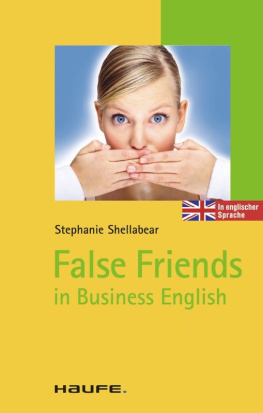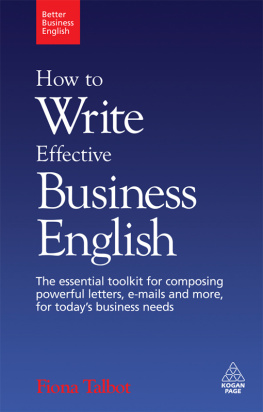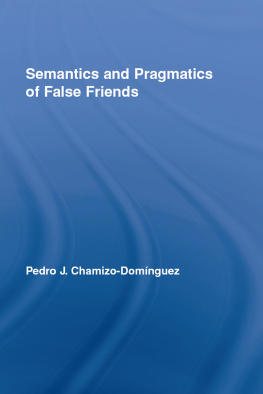Stephanie Shellabear - False Friends in Business English
Here you can read online Stephanie Shellabear - False Friends in Business English full text of the book (entire story) in english for free. Download pdf and epub, get meaning, cover and reviews about this ebook. year: 2011, publisher: Haufe Lexware GmbH, genre: Romance novel. Description of the work, (preface) as well as reviews are available. Best literature library LitArk.com created for fans of good reading and offers a wide selection of genres:
Romance novel
Science fiction
Adventure
Detective
Science
History
Home and family
Prose
Art
Politics
Computer
Non-fiction
Religion
Business
Children
Humor
Choose a favorite category and find really read worthwhile books. Enjoy immersion in the world of imagination, feel the emotions of the characters or learn something new for yourself, make an fascinating discovery.
- Book:False Friends in Business English
- Author:
- Publisher:Haufe Lexware GmbH
- Genre:
- Year:2011
- Rating:5 / 5
- Favourites:Add to favourites
- Your mark:
- 100
- 1
- 2
- 3
- 4
- 5
False Friends in Business English: summary, description and annotation
We offer to read an annotation, description, summary or preface (depends on what the author of the book "False Friends in Business English" wrote himself). If you haven't found the necessary information about the book — write in the comments, we will try to find it.
False Friends in Business English — read online for free the complete book (whole text) full work
Below is the text of the book, divided by pages. System saving the place of the last page read, allows you to conveniently read the book "False Friends in Business English" online for free, without having to search again every time where you left off. Put a bookmark, and you can go to the page where you finished reading at any time.
Font size:
Interval:
Bookmark:
Ein falscher Freund (engl. false friend) ist ein Wort in einer Fremdsprache, das genauso oder hnlich klingt oder geschrieben wird wie ein Wort in Ihrer Muttersprache, aber eine andere Bedeutung hat. Deshalb ist ein false friend nicht der korrekte fremdsprachliche Begriff. Wenn Sie false friends im Gesprch oder im Schriftverkehr benutzen, kann dies unterschiedliche Folgen haben: Muttersprachler mit guten Deutschkenntnissen werden in der Regel wissen, was Sie eigentlich sagen oder schreiben wollten. Sie werden Sie aber nur korrigieren, um Missverstndnissen vorzubeugen oder Sie davor zu bewahren, sich lcherlich zu machen. Hufig sprechen Ihre Geschftspartner jedoch kein Deutsch und werden durch false friends in der Regel ziemlich verwirrt sein.
Und Vorsicht: Es gibt sehr viele false friends! Dieser Taschen-Guide zeigt Ihnen die wichtigsten, zunchst anhand zahlreicher typischer Business-Situationen von der Bewerbung ber den Small Talk bis zur Verhandlung. Auf diese Weise knnen Sie sich die korrekten englischen Begriffe besser einprgen. Eine umfangreiche Liste der false friends dient Ihnen als stndiger Begleiter zum schnellen Nachschlagen.
Ich wnsche Ihnen viel Spa beim Entdecken der echten Freunde!
Stephanie Shellabear
When it comes to doing business, you always need to be prepared. If you are doing business in English, but your mother tongue is German, then you need to be prepared for the traps that the English language holds for you.
The following chapter will provide you with information about:
the different kinds of false friends (page 6),
the effect on your business contacts of language errors (page 8),
typical mistakes in CVs, applications and interviews (page 9).
Take the German word Mappe. Map exists in English but, while you are talking about something to put papers in, your English-speaking business contact thinks you mean a large piece of paper with roads and towns on it (Landkarte). The correct English word for Mappe- in this particular case is folder. Other examples are Gift/gift, Kredit/credit, Fabrik/ fabric. You will find a list of the more frequently heard false friends in the latter half of this book.
These are words that generally mean the same, but it depends on the context. Here is a standard example: extra and Extra- If you say in German Ich habe es extra so hingestellt, damit du es sofort siehst, you would need to say in English I put it there deliberately so that you would see it. If you are in a restaurant, though, and order eine Extra-Portion Gemse you can say in English an extra portion of vegetables. There is one verb which deserves special mention here, because it is probably the most frequently made mistake, namely: machen/make. We make mistakes, we make coffee, we make a fuss, but we do sports, we do courses and we do the accounts.
You probably already know not to describe an Unternehmer as an undertaker, unless of course that particular entrepreneur or business owner really is an undertaker ( Leichenbestatter ). Similarly, it is widely known that a Hochschule is not the same thing as a high school.
These are English words that have found their way into everyday German usage but mean something completely different to the original English word, such as Handy, Peeling and Body . Others, such as Wellness and Neckholder , do not even exist in English; and some can shock your audience or perhaps make them laugh although you meant to be serious: take public viewing , for instance, which until now meant solely ffentliche Aufbahrung (einer Leiche) ! It is better to talk about a live transmission on a big screen. Who knows, perhaps these terms will gradually find their way into everyday English.
There is a strange phenomenon which occurs with just a few German words. They are often translated by German speakers into words that do not exist in English. One false friend of this type is reservieren , which many express as reservate. Reservate does not exist, but it is said automatically by many people due to what they have learnt so far of the English language.
Take the German word isoliert : if the context is a location that is far away from anywhere else, then the translation is indeed isolated. However, this is a false friend if we are talking about buildings and stopping the heat escaping from them; in this context you need to speak of insulation.
How disappointed or confused (or perhaps shocked!) will your conversation partner or email recipient feel if you use a false friend? The answer is: it depends. It depends on the word itself, and on how tolerant your opposite number is of hearing mistakes. It also depends on whether the person you speak or write to has any knowledge of German. The less German they know, the more potential there is for misunderstandings.
Below is a simple scale to show you how other speakers of English, but especially native speakers, may feel when they hear mistakes made by (other) non-native speakers. These signs will help you to see how critical the use of a false friend can be, and it will hopefully help you to recognize which things you need to pay particular attention to:
small error; it can cause some confusion, |
more critical; potential for big misunderstandings, |
don't say this: it may cause shock or embarrassment! |
There is no denying it: English is everywhere. If you are searching for a new job, it is likely that you will see under the list of requirements for the position: gute (or perhaps hervorragende, maybe verhandlungssichere) Englischkenntnisse. What sort of things should you be aware of when you apply?
Dear Sir/Madam
I am applying for the job of photograph which you advertised in the Daily Times on Friday 3 September 2010.
Enclosed is my CV. You will see that I started to study to become an advocate, but I discovered a love of cameras and decided to become an undertaker instead and started up my own photo studio
The German word is Fotograf and the English for this is photographer . This applicant has just described himself as a photo.
An advocate is someone who supports, for example, an idea, e.g. he is a strong advocate of renewable energy. It is not the same as Advokat, which in English is lawyer or attorney .
If only the English for Unternehmer were undertaker life would be so easy! An undertaker is, as already mentioned, Bestatter, and the word the applicant should have used is entrepreneur or business owner .
Dear Sir/Madam
I have been following the developments of your company for a while now with great interest. It is my wish to work for a globally successful company and so I am sending you my CV in case you actually have a vacancy for someone with my qualifications.
I was an executive assistant in the direction of a medium-sized German company for three years and am a very engaged team worker. My former chief was very satisfied with me and I am enclosing the reference that he wrote
Font size:
Interval:
Bookmark:
Similar books «False Friends in Business English»
Look at similar books to False Friends in Business English. We have selected literature similar in name and meaning in the hope of providing readers with more options to find new, interesting, not yet read works.
Discussion, reviews of the book False Friends in Business English and just readers' own opinions. Leave your comments, write what you think about the work, its meaning or the main characters. Specify what exactly you liked and what you didn't like, and why you think so.









